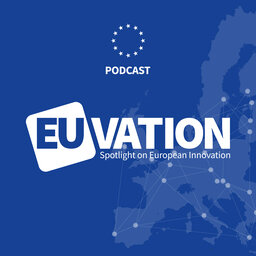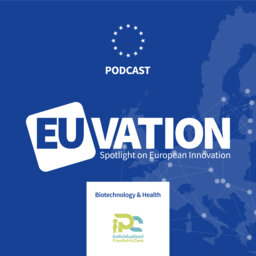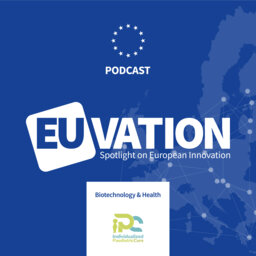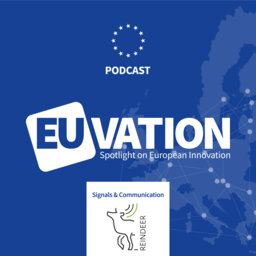EPIC (3) H2020 Project: Creating a New Generation of Forward-Error-Correction Codes
In this episode we speak with Jhon Jimenez and Timo Lehnigk-Emden from Creonic. They are project partners in EPIC. We talk about project completion and what practical results can be observed and applied.
The EPIC project has received funding from the European Union's Horizon 2020 research and innovation programme under grant agreement No. 760150.
Powerful collaborations, cutting edge science and curious minds coming together for a glimpse of the future. Stay tuned as we look at the latest updates on some of the most promising technology projects.
Hello and welcome. I'm your host Peter Balint from Technikon and today we will look at the EPIC project once again. EPIC is a European effort with eight partners from seven different countries. Partners include SMEs, industrial concerns, research institutions and universities. Like many other current technology projects EPIC is here to ensure that the things that work great now, will also work in the future.
In the case of EPIC, the focus is on forward error correction. Today we speak with Jhon Jimenez and Timo Lehnigk-Emden both from Creonic in Germany. Creonic designs and delivers complex signal processing functions for communication systems. We'll start with Jhon. Can you break things down for us a bit? Who needs forward error correction?
Well actually we all need forward error correction even though we don't notice it. What that means is whenever we transmit data over these sort of digital communication that data has to go... to travel through a medium and more often than not, this is a noisy medium and data gets distorted. What forward error correction does is it adds some redundancy to this information so it could be corrected at the other end without without needing to retransmit information or without needing to transmit more often the information. That's basically what it's all about. So if you're using a smartphone if you're using the Internet there's forward error correction in the back working for you making in your communication as reliable as possible.
Yes right. Every every kind of digital transmission use forward error correction. This means every time you transmit any digital data error correction as an essential part of it.
So it sounds like this is something that... it's a process that has to be there although nobody really sees it. It's just the end result is that people get their data. People get their voice coming across the telephone in error free fashion is that right? Jhon?
Yeah absolutely. I mean it's not completely error free. I mean some errors come here and there that's unavoidable because of the nature of things. But the goal is to make it as reliable as possible and yes just a transparent process that happens without us noticing.
So without error correction we wouldn't be able to communicate essentially Timo?
Yes right.
Or things would take a lot longer anyways.
Yeah or you you can think about this like old analog telephone wire -these had no error correction of course but everything which is done in the digital world must be protected by a forward error correction.
How long has forward error correction been in use?
I would say as long as digital communications have been around. The theory behind it dates back to 1948 actually from a couple of scientific papers by Claude Shannon and Alan Turing which are respectively part of the information theory and computer science and these theories have been around from from the 40s and now that the digital communication era has arrived people know this is actually something useful for this kind of application and they've been applying it to it. So giving a precise date on the arrival forward error correction is a little bit difficult to answer .
OK, but the situation now is that we're moving into this era where we have super high speed communication and data transfer rates and the forward air correction codes that we've been using in the past to simply won't work. Is that right Jhon?
Well yes and No, it's not that they won't work it's just that the last couple of decades we've been relying on technology scaling to make things faster. What that means is that we're relying on the actual chips and transistors getting smaller so get things faster. But we've actually never gone into the architecture and algorithms themselves in a way that we can refine them that we can make more efficient about it. And that's the actual goal of EPIC to make them... to optimize this architectural algorithm algorithmic approaches so that we could take more advantage of the technology that we have and also leverage more throughput and and benefits from from this technology.
Jhon, you're a project partner in EPIC, can you tell us specifically what your role is in EPIC?
Well we are a SME in the project. Our core market is actually intellectual property for digital communications so this seemed like a very appropriate project for us. And in EPIC we actually investigate one of the types of codes that we describe to LDPC codes and more specifically a somewhat new algorithm called spatially coupled LDPC codes and that's something that we wanted to investigate in this project. Also we've made some FPGA demonstrations in a couple of conferences showcasing the results of the project. For instance, last year we had a presentation in the EuCNC in Valencia Spain where we showcase some of the results that we had in the project. So thats basically one of the tasks that we have around here in the project.
So Timo tell me your specific role in the EPIC project.
I'm the technical manager of this project.
OK. And this is a project that has many partners from many different European countries. And is it your job to sort of pull them all together and make sure they're working in the same direction?
No that's a part of the technical lead. My job is to manage the project within Creonic.
I see. OK.
To make sure that we have our resources that the people that's the people work in the right direction, that the communication with all the partners works fine. And and if we have problems in administrative stuff or technical stuff.
I see. Based on what you're telling me it sounds like Creonic is able to bring a lot to the table then when it comes to EPIC in terms of technology, experience and this is this is what you do actually. So...
Yes that's... at least that's what we hope for.
OK. OK. I wanted to ask you also in these types of projects many times there are use cases and these use cases are sort of real life situations where this technology might be used and many times these use cases help the average person to understand a little bit more about the project. Do you have such use cases in EPIC? Jhon?
Yeah we have identified a couple of use cases for this project. And they actually can be classified in terms of infrastructure and consumer electronics I guess the average user would be more familiar with the latter specifically, something that we found to be pretty new would be these VR headsets that are coming out in later years.
And I should mention, VR is a virtual reality.
Exactly. This these new things of augmented reality, virtual reality. The video input that you need is actually so demanding because you have to render constantly, sometimes unexpectedly because the user are constantly moving and changing the environments. So this is a very computationally heavy and data heavy application. And what that means is that you would need a lot of throughput a lot information would need to be transferred very fast for this kind of application. So VR sounds like one of the ideal use cases for this project. Also, as throughput gets considerably higher that would mean that central processing in your personal computer would benefit from this as well. And even with smartphones and from the infrastructure perspective that means the cellular network will also get faster. Now we're hearing a lot about 5G and later days and what that means is that connectivity will get improved so you can ... more people can get a reliable service in larger areas and you can actually download and upload information much faster then than we used to. So in order to support that the network has to have a very robust backbone in order to transmit all this huge amounts of information so that this that's something that we also identified as being a potential candidate for a EPIC use case.
The use case which is most interesting for Creonic is this HTS this high throughput satellite stuff because you see we see there actually a large demand in increasing network capacity of satellite. And satellite communication is a very essential part to to establish transmissions and links around the globe. And everybody wants to to increase the data rates on the client side and the satellite network which are already launched and which will become larger and larger in the next years will play a major role in reaching this this goal of a global... of a global high speed network which is available everywhere and every time.
OK. And you often refer to be on 5G speeds; in fact, you are working on forward error correction for beyond 5G speeds. What does this mean in terms of time/ I mean, when is it that we will see the fruits of your labor in day to day life?
Well, it's hard to tell precisely when... I mean 5G is currently being deployed; it passed already the standardization period and as you can see the 5G networks are being slowly but steadily deployed at least in Europe and currently I mean from from discussions and material that's being presented in recent conferences although 5G hasn't been completely deployed yet people are already talking about what's next? So people are talking about 6G or even 7G which is basically beyond 5G. So I wouldn't I wouldn't be surprised if some standardization efforts are being done currently being done for 6G and 7G. So let's say a couple of years five years I would expect the deployment of this new beyond 5G technologies...or at least that's my that's my guess as to the matter.
But there's nothing really solid, I mean it just sort of depends on the way technology moves is that right?
Yeah basically, but taking into account the current trend trends, I wouldn't be surprised if beyond 5G deployed in a couple of years.
OK. And I was just looking on the website for that for the EPIC project and I see that the project is actually done. OK, So how are things... I mean how do you feel, you know, could you say at this point that this was a successful project or we still have a lot more work to do or is is it too is it too early to really say much.
Well there's always there's always going to be work to do. And that's actually a good thing we want things to continue to be constantly continuously improved. But I think we are actually very satisfied with the results that we've had. We only had a minor step back in the last couple of months because of the current situation with the pandemic but other than that I think we were very very satisfied with our results. And we hope that we can actually improve upon them in future projects or future endeavors.
Timo?
I feel very good because we have a lot of interesting problems to solve and we gained a lot of experiences and new knowledge and I think also that a that the people have been working really really hard on this project and they really enjoy the difference to all day business in sense of communicate with other companies and other research institutes.
And how does this work in a project like this. I mean your team has put forth quite a bit of effort to accomplish the goals of EPIC, when EPIC goes away then, do you continue with these efforts or are they funneled somewhere else or is there a possibility for a second EPIC project along the way?
I couldn't tell yet but we're we're actually we're actually in some discussions about whether or not we continue... some of the partners continue in separate projects. Some of these partners are academic institutions; a couple of universities, so of course they would like to continue. From our perspective as an SME would also be glad to continuance in a project like this or maybe a different endeavor, maybe leveraging a couple of IP products for the markets so... of course we would like to work upon the work that's been done in EPIC so far. There have been some discussions as I said continuing up upon this work. But I wouldn't be able to tell for sure how that will shape out
I see. Timo, let me get your assessment. Could you propose a second project at some point after EPIC is done?
Yes. That's of course possible. In general we we tried to keep in contact with the partners to contact them if we have some special problems which are related to their special knowledge.
OK. Yeah I guess we'll see down the road. I wanted to ask you too Jhon, a project like this which consists of eight partners from seven different countries surely faces some challenges or roadblocks. Could you point to anything specific? And how did you overcome these challenges?
Well yes mostly that's...I would say that that goes down to coordination where sometimes it's hard to coordinate some efforts between all of us being in different countries. But that's just the minor league roadblock. And actually I wouldn't consider it to be such a big deal I would say we've been... Technikon, for instance has done a very good job in coordinating the project. The roadblocks that we've had for instance would be access into the some specific technology resources that we would very much like to use for our research but we couldn't because of logistics or legal reasons. But other than that I don't think we we've had big challenges or threatening challenges I would say we don't have something that.
OK so everything seemed to move along as scheduled -yeah that's great. OK, is there anything you would like to add about EPIC
Well I think as I said it's been a very successful project. All of the partners are also very satisfied with our results. We're all very happy with the outcomes that we've gotten. And we're hoping to work again in the same or maybe a continuation of the project if things shape out accordingly.
You know, this is an important project even though people can't see it or touch it it's important that you're doing this work so thank you for your efforts there. And thanks for pushing this project through and giving us what we need to continue on in next generation of communications. And thanks for talking to us about it today on this podcast.
Thanks Peter.
Well thank you for having us as well.
For more information about the EPIC project, check out their website epic-h2020.eu. This podcast has been brought to you by Technikon. The EPIC project has received funding from the European Union's Horizon 2020 research and innovation program under grant agreement number 760150 .
 EUVATION: Spotlight on European Innovation
EUVATION: Spotlight on European Innovation


